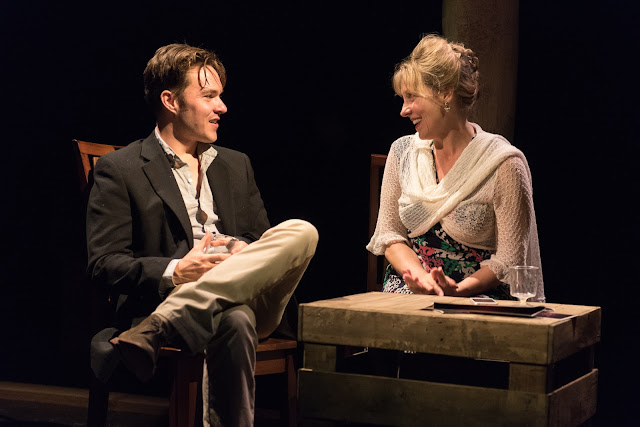"Trunks for the Memories"
 |
| Stars range from 5-1. |

 Memory issues plague David Huntington (Drew Ledbetter), the central character of Jackob G. Hofman’s lugubrious A Persistent Memory at the Beckett Theatre; as he struggles to prevent his memories from slipping this way and that, David even considers that he might have early-onset Alzheimer’s. Still, his problems seem more related to blocked feelings stemming from his difficulty in processing personal tragedies than from mental disease. Mainly, they appear to be the dramatist’s attempt to equate the human ability to grieve and its connection to memory to the mental and emotional capacities of elephants.
Memory issues plague David Huntington (Drew Ledbetter), the central character of Jackob G. Hofman’s lugubrious A Persistent Memory at the Beckett Theatre; as he struggles to prevent his memories from slipping this way and that, David even considers that he might have early-onset Alzheimer’s. Still, his problems seem more related to blocked feelings stemming from his difficulty in processing personal tragedies than from mental disease. Mainly, they appear to be the dramatist’s attempt to equate the human ability to grieve and its connection to memory to the mental and emotional capacities of elephants.  |
| A Persistent Memory. Photo: Russ Rowland. |
Hofman’s structurally muddled play is framed by opening and closing scenes in Entebbe, Uganda, where David, privileged 30ish scion of a wealthy, philanthropic family, who’s seeking to fill an emotional hollow in his gut, has gone to learn about the rapid decline in the elephant population caused by ivory poaching. (He also participates in rebuilding hurricane-damaged homes in Mississippi.) In between, the action jumps around chronologically and spatially within the period of a year.
 |
| Drew Ledbetter, Victoria Vance. Photo: Russ Rowland. |
Thus the play moves from Uganda to a brief, wordless scene two weeks earlier in an American home followed by a scene in a university lecture hall three days earlier, and then by one in a small Manhattan apartment nine months previously. After that we go back yet another three months to a Connecticut restaurant only for the action to move to a night club three weeks before the play’s first scene. And so on. While the script indicates precisely where and when the scenes are taking place no such information is conveyed to the audience, which—if it cares to—must decipher these things on its own.
 |
| Ariel Estrada, Drew Ledbetter. Photo: Russ Rowland. |
In Uganda, David, who keeps a notebook of his experiences as a way of holding on to his fleeting remembrances, interviews Olivia (Victoria Vance), a European UNICEF worker in her 40s. (David’s family foundation funds important causes like saving Africa’s elephants.) She informs him of the increasing number of incidents in which elephants, historically peaceful, have been stampeding and harming humans, possibly a conscious reaction to their dying out. We also discover there’s evidence that they also mourn human death. (The story of elephants grieving over the death of “elephant whisperer” Lawrence Anthony has been documented, but I can’t find anything about elephants expressing remorse over the death of someone they’ve crushed.) The scene also mentions David’s late kid brother, Gabriel, for whom a traumatic childhood experience ultimately led to suicide, which haunts David, as do the circumstances surrounding his mother’s death.
 |
| Drew Ledbetter, Lisa Bostnar. Photo: Russ Rowland. |
David and Olivia’s mutual contact is the Ugandan-American Elijah (Richard Prioleau), David’s close friend since boarding school and Oxford. He and his coke-snorting, violinist girlfriend, Carly (Claire Warden), figure prominently in the action, which, for some reason, hints at Elijah’s physical attraction for David. The other characters are Kasem (Ariel Estrada), a Thai whose lectures offer valuable information about pachyderm behavior, and Marie (Lisa Bostnar), a well-meaning widow in her 50s who becomes engaged to David’s father; she’s snidely dismissed by David—devoted to his memories of his late mother—as a probable gold-digger. Loss affects several of these people—Carly, who loses her violin; Marie, who lost her husband; and Olivia, whose alcoholism not only fueled her separation from her husband but made her unable to recall just what she did so she could take responsibility for it.
 |
| Claire Warden, Richard Prioleau. Photo: Russ Rowland. |
Parris Bradley has designed a scenic framework composed of what might as easily be tusks as the ribs of an animal corpse in an elephant graveyard set against a cyclorama; crate-like furnishings, including a bed sitting awkwardly at center regardless of the locale, are scattered about. Miles Polaski provides a fine, throbbing sound score and the performance is dramatically lit by Greg Solomon, especially when the actors are highlighted in silhouette as they shift furniture in somberly choreographed movement; however, neither Jessi D. Hill’s snail-paced direction nor any of the mostly low-energy performances can do much to enliven Hofman’s play; the best work is by Prioleau and Bostnar. Although not new, the information about elephants is interesting but hasn’t been fully integrated into the dramatic action.
Hofman also includes several intrusive expository monologues, including one in which Olivia addresses an A.A. meeting and another featuring Marie speaking to her late husband’s grave. His choice to scramble the play’s chronology may have poetic qualities but it’s a distracting conceit that only serves to highlight the play’s weaknesses. If the intent is to suggest David’s disconnected memories it collapses since so much of what happens takes place without his presence.
I’m afraid A Persistent Memory is one I’m likely to soon forget.
OTHER VIEWPOINTS:
Beckett Theatre/Theatre Row
410 W. 42nd Street, NYC
Through June 18